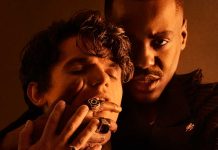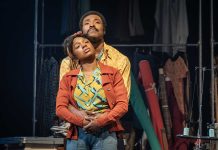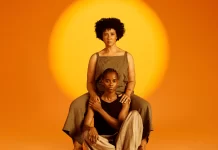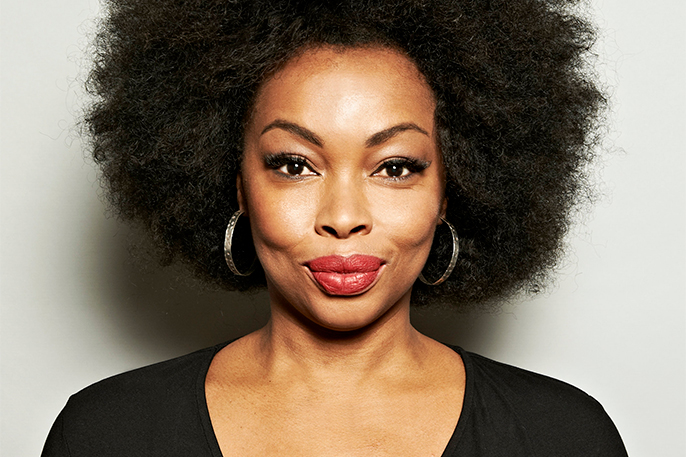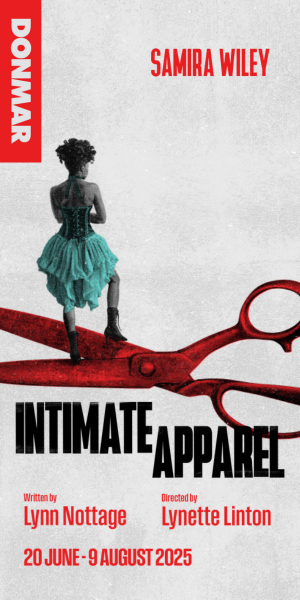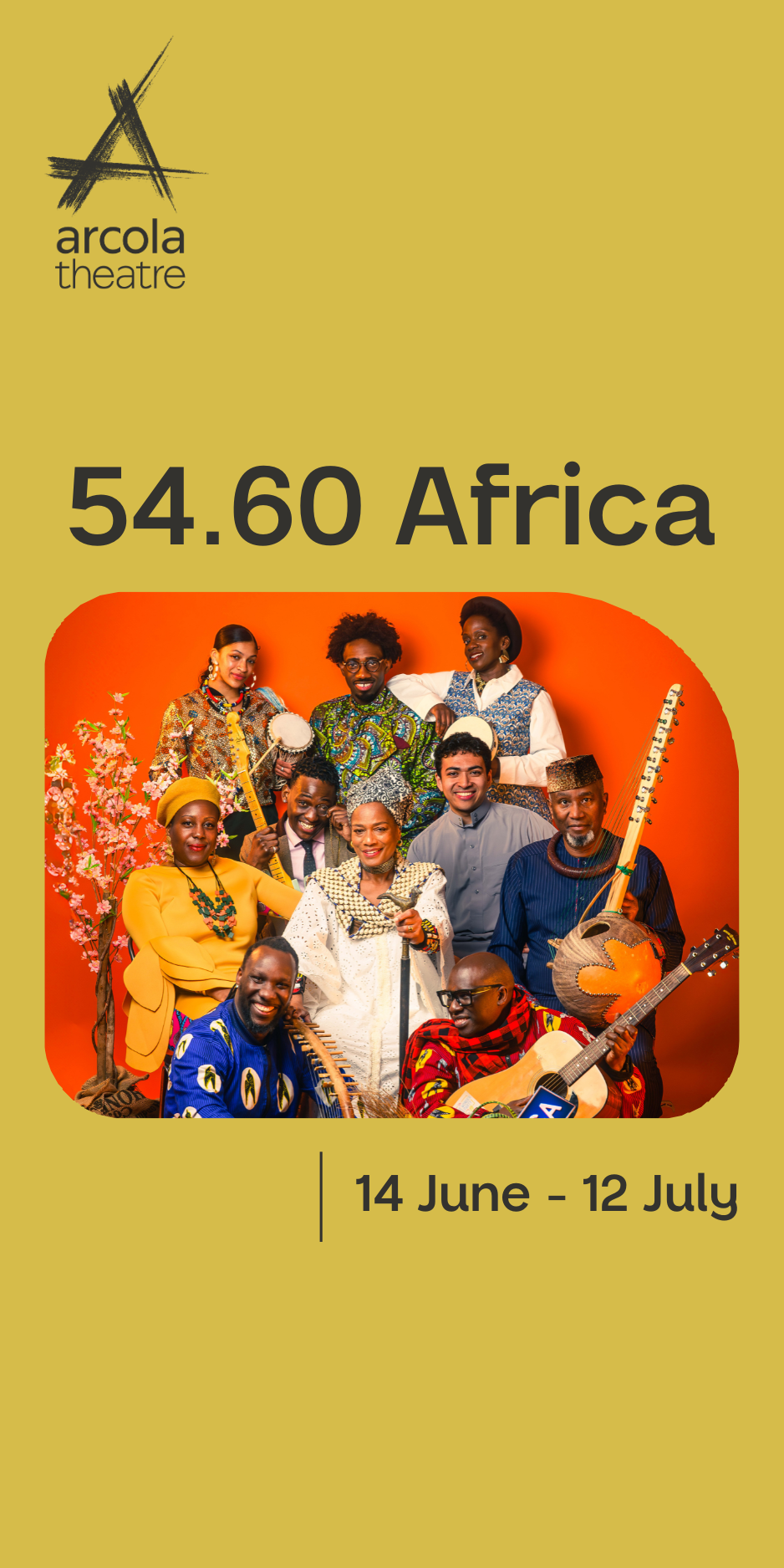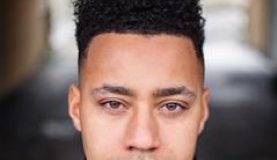Phina Oruche – interview
Identity Crisis
Ovalhouse
Afridiziak Theatre News sat down with model and actress Phina Oruche ahead of her new one- woman show ‘Identity Crisis’ to talk about her life, career and identity.
See listing for Identity Crisis
Congratulations on your new run in London! It must be exciting to be performing to a sold out audience at the Ovalhouse. How did the idea for a one woman show come about?
The show first started in Liverpool. I didn’t just turn up in Edinburgh, there are over 3000 shows, the whole world is there. I started in Liverpool as I’m from Liverpool (she told me in her Scouse accent.) I remember when we did the show for the first time at Edgehill University and the audience went crazy, they absolutely loved it. They were a bunch of white middle class students and they related to my show and that was like wow for me, I can do this. And from there I started to go to regional theatres and do the show, and take questions and find out more from the audience. It’s been a two year journey for me; it has literally raised me from the dead
What do you mean?
Well let me start from the beginning. At the time a lot had been going on in my life, a lot of negative things. First I was being stalked, some fella was stalking me and we had to go through all of that and get him put in prison, then I was robbed of £20,000 by somebody. Then my niece died in my house and that just sent me down. I was on the floor, I mean I was really knocked on the floor and into the floorboards I was through the floorboards and past the cellar and into the soil. In fact I was what was underneath the soil. I was lower than a rat’s tail.
How did this all happen I don’t even know what to say?
I don’t even know how all of this happened, it was just one incident at a time, one after the other struggles kept coming. They say ‘If it doesn’t kill you it makes you stronger’ but it doesn’t make you stronger first, not straightaway. If you go to church you know how they say ‘count it all joy’ in church when you are going through trials, at the time I was fuming I was like ‘hole on’ (in a Jamaican accent) ‘just hole on’, count it all joy is fabulous to believe in but it’s also tripe when at the time you are going through something dreadful like I was it’s not possible to count any joy. When your 19-year-old niece is babysitting your 2-year-old son and you go to a BBC conference and return home to find her dead it is impossible to see any joy. I know I couldn’t. I remember when I went into church sometime after and somebody was like “Girl I heard that there was a dead body in your house”.
I was really knocked on the floor and into the floorboards I was through the floorboards and past the cellar and into the soil. In fact I was what was underneath the soil. I was lower than a rat’s tail.
They just said that to you straight to your face?!
Listen, I was just shocked and already traumatised so I had to leave. I just ran out of there. The thing is when you are famous and have any kind of public life people forget that you’re human, they just see your life as gossip. I was really knocked on the floor and into the floorboards I was through the floorboards and past the cellar and into the soil. In fact I was what was underneath the soil. I was lower than a rat’s tail.
That is so wrong!
It’s neither right nor wrong it just is. I got into a position where my face hurt. My face hurt because of the mask I had to wear to live life daily. During this period of darkness I still had to be a mother, I had to raise my son and try to figure out does he know what’s going on, does he understand that she died. Should I put him into therapy? So many questions and things going on that I was not prepared for; I don’t have the skills for that I’m just a normal mum. For a long time I was mad at the world, mad at God and I just closed down. Completely shut down and stopped going places. I’m still reclusive to be honest. At that time in Liverpool I had a radio show, I’d just come off of Hollyoaks, I had a column that I wrote. It was like I was juggling all of these things and people kept asking me everything about everything and then there’s my son calling out for me ‘mum’ he needed me and then there’s my husband asking me to roll over you know what I mean, he still needed me.
We both share a laugh.
It was just all on. I have never been one that can’t get IT done, whatever IT is. And then on top of that there were all of these deaths all over social media and on the news. Sandra Bland, Tamir Rice, Eric Garner, this one, that one all shot up on Facebook Live and hashtags on Twitter. All of these black people just dead up for the world to see with no justice regardless of the blatant evidence against their killers. It was all too much something just went in my mind, I wouldn’t say that I had a nervous breakdown but I was depressed. Grief inspired depression I think a professional would call it. I had something of a mental collapse due to the grief and stress, my marriage was breaking down and it seemed like everything that was going on in my life was breaking down all at once which was not good. It was all happening one after the after, it all just went at once.
Did you talk to anyone professional?
No I didn’t want to broadcast it for the whole world to see. Also now that I’m in a better place I can see it, at the time I couldn’t really see. It’s only now that I can see that I was off my actual rocker. You can’t see it at the time when you’re in that place, my husband could see it but I couldn’t. At the time I was bitter, twisted, sick, depressed, not going out, harassed and in a really dark place. I stopped writing the column, I left the radio show and decided to go to university to study a Masters in Black Representation in the Media.
Oh wow, what led to the Masters?
Yes I’m not a stupid girl I have a degree. At the time I chose the course because I wanted to see if some of the negative experiences that I had been through in the entertainment industry were due to something I had done or was it systemic. I just wanted to see. I wanted to do the research and look at all of these different TV shows, and all of these people’s careers. It was fascinatingly depressing because it was systemic and there are a lot of reasons why things are the way they are. It could have made me worse but then it made things clearer that these things were not about me it’s not that people dislike me, it’s more about where the writers are coming from and what class the directors are from and the gatekeeping system across the industry. So it’s systemic but it is not just me. Studying was supposed to cheer me up but to be honest it was making me worse. And then a very smart professor at my uni, Professor Roger Shannon, who I always give props to whenever I speak to anyone about this. He said to me “You’re going to write a one woman show”, and I said “I will not”, then we had a back and forth. He won and I wrote the show in one sitting.
Gosh, how many hours did that take you?
I can’t remember but it was there to be done. It just came out. When you think about all of the things that had been going on, all of the things that I went through. I mean I had been working for 14 months straight from the death of my niece I kept on working on autopilot.
It was a coping mechanism?
Yeah it was. So when it all came out there was just so much stuff that needed to come out. It literally just burst out of me. The most powerful thing you can do in your life is to stop, just pause. When I stopped it all came out in this show. Then Bill Hopkinson, the director, he came on board and shaped it around. It was a series of monologues at first, one character after another and he was the one that made it an interactive piece and gave it the three act structure and the imagery came from me trying to get back to me. All of what I studied in my Masters filtered through in my writing of Identity Crisis, and obviously the course was heavy stuff, my dissertation was heavy enough but I wanted to make the show funny whilst still dealing with everything. I decided that I’m going to play nine parts and do everything, be all of the characters because I can. It came from there’s nothing else I can do to pump some air back into my flailing existence.
Who are you now?
One day I was going through all of my old modelling stuff from back in the day and what was interesting when I was looking at these photos was that back then I had short natural hair and I was skinny and looking really fantastic, and I had forgot about her. I forgot about this 20-year-old girl who wouldn’t take no for an answer, who set the world alight with her big kilowatt smile, who left Liverpool to go to London and then left London to go to the US and lived in New York City and LA on her own. Here I was 20 odd years later and I could barely make it to the end of the street. Literally I would take my son to school and then shuffle home, take my dog to the park and then shuffle home, all within a mile or so from my house. Beyond dealing with my son and my husband I had nothing left and I had to go back to that young girl as a sort of Rosetta Stone on who I was. Prior to being someone’s mother, and prior to being someone’s wife, prior to being someone’s aunty and someone else’s columnist or radio presenter or an actress in a TV soap, I was just me.
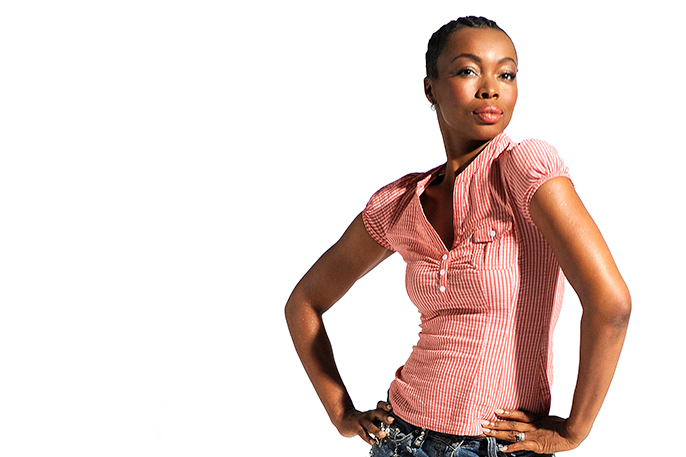
You’ve had a lot of success as a model and an actress. You are inspiring to a lot of young black women, including myself as a British born Nigerian and a woman I am always proud to see your name in lights. How did you navigate the industry as I’m sure there were a lot of roadblocks on your way?
Oh wow really? Thank you. I mean do you know what I’m too short to be a model, I’m only 5’7” on a good day so I was too short you had to be 5’8” but I was adamant that I had to model I didn’t care what they were talking about. Every single agency in London turned me down at least once if not several times. But that’s what I’m saying that’s why when I started writing the show I had to go back to the model. Because the middle aged mum was flattened and harassed by life but that 20 year old was on fire, she didn’t take no for an answer.
Back at that time in Liverpool when I decided to be a model there were not many choices for anyone and virtually zero choices if you were black and a young girl except for maybe getting knocked up. I’m not saying there’s anything wrong with choosing to be a young mum but at that time I wanted more for my life, I wanted to travel and see the world. And then there was my mother who is this wild, complex, fabulous woman and a single parent extraordinaire. She was born in Nigeria and came to Liverpool so she had travelled when you think about it our parents came from Nigeria and they didn’t know where they were going or what to expect when they got here. They fought and dealt with serious things that we can’t even imagine. So when I think about that I know that you have to fight, you have to push for what you want.
My mother came all this way, she raised four children by herself and did it well as we are all successful adults now in our own rights, property owners, all educated, and all run businesses. So if she can do all of that what is my excuse?
Identity Crisis is a sort of pie in the sky, tongue in cheek celebration of the fact that I can be who I want and so can you if you choose to.
What are any of our excuses?
When I started out in my modelling career I had rejection. So much rejection. Did they say my lips were too big? Of course. Did they say they didn’t like my natural hair? Of course. Did they say I had to look like Naomi? Of course. Did they say I had to wear a weave? Of course. Did they say my bum was too big? Yes of course. I got all of that but they also told Stella Tennant that she was ugly so I saw that it was not just about my race so I can’t use that as an excuse, it was just part and parcel of the industry and you need tenacity to keep going after what you want. I think that we give race too much credence sometimes and that’s why in the show I am playing all of these people. I would never get cast as a 60-year-old white guy or a 30-year-old Rasta but I’m an actress so I can play anybody regardless of race, age or creed. So the show is a sort of pie in the sky, tongue in cheek celebration of the fact that I can be who I want and so can you if you choose to. It was good to focus on my characters and focus on something else away from all of the things that were happening to me in my life. Creating this show and performing it for people has been such a freeing experience, even if nobody hired me again I have already written this show and know I can do it. It has been very cathartic.
What is identity to you?
Someone asked me why do I see identity as a crisis, and that is not what the show is about or what I’m trying to say. Identity is not a crisis when you’re well. When things went wrong for me there was crisis and it stemmed from my identity. Who am I? Am I a mum, a wife, am I all of these things that are written in this letter from the BNP? Am I money? Am I a celebrity? I had to get back to basics, to God, to spirit. So that’s what this show has been about. The next five days in London performing at the Ovalhouse is going to be a celebration. Even if it’s just me in the theatre I will have a ball for myself and for Chichi my niece. I am forever changed from this experience, everything changed from her death in that moment. My life changed, the people I keep around me changed, I made peace with God and Identity Crisis is a celebration of all of the things that were good and are still good in life.
Info: Identity Crisis is at Ovalhouse from 9-13 May 2017 / See listing / Book tickets / Watch trailer
















